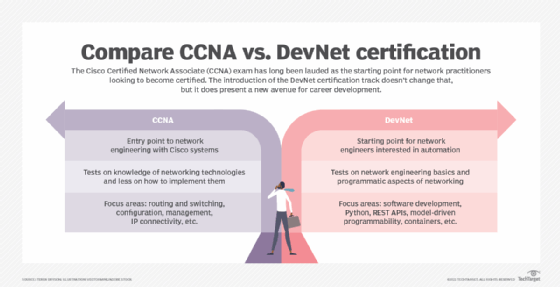
Rawf8 - stock.adobe.com
DevNet vs. CCNA: What's the difference?
While CCNA certification concentrates on foundational network engineering knowledge, DevNet certification focuses on modern networking concepts, like automation and software.
For years, the Cisco Certified Network Associate, or CCNA, exam has been the career entry point for tens of thousands or more network engineers. The Cisco exam path -- beginning with CCNA and ending with the much-vaunted Cisco Certified Internetwork Expert -- has been so successful that a significant plurality of network engineers have held one or more of these certifications during their careers.
Cisco didn't invent IT certification exams, but it did perfect them in a way only Novell had done at a similar level before. Whether network practitioners had a relevant certification was often the gatekeeper to getting hired, regardless of what other experience they had on their resumes. While Cisco certification tracks expanded over time to include many specialties, CCNA remained the primary entry point -- ignoring Cisco Certified Entry Networking Technician -- until now.
The evolution of networking
One of the most significant changes to the networking landscape over the past few years came in the form of network automation and orchestration. Simply put, networking shifted to an idea that, instead of repeatedly hammering commands by hand into a command-line interface, those tasks, and others like them, should be handled programmatically.
But this method changes the network engineering practitioner's paradigm enough that CCNA doesn't test relevant knowledge completely. To be sure, networking fundamentals are core knowledge for anyone in the field and remain highly prescient even in the face of this new methodology. But those fundamentals are incomplete knowledge.
What is CCNA?
CCNA is still the gold standard entry point to network engineering knowledge in the Cisco ecosystem. It tests network engineers on things they'll need to understand for the rest of their career, regardless of how they interface with networking devices. In other words, it tests one's knowledge of network technologies and not as much on how to implement those technologies. It's a great first step for Cisco Networking Academy students, as well as anyone with limited knowledge of networking.
What is DevNet?
The new DevNet Associate exam -- the first in the DevNet certification track -- is a parallel track to CCNA, focused on the programmatic aspects of network engineering. While it does test for the kind of knowledge one would expect out of the CCNA curriculum, it is more concerned overall with concepts like Python, REST, model-driven programmability, containers and other modern aspects of network engineering.
The DevNet Associate exam does cover network engineering basics but concerns itself more with the emerging programmatic paradigm of network management. It assumes network engineers already have a certain level of knowledge about networks and doesn't go as deep into pure networking as it does into other concepts. This certification would be a great starting point for current network engineers looking to move into more automation-focused roles or those looking to learn and validate their knowledge on more modern network management methods.

DevNet vs. CCNA: How to choose
Now, the question is whether the DevNet certification becomes the obvious path to take toward Cisco certification, or is CCNA still valid? Both certifications are valuable and have their place. Where you start is up to you, your existing knowledge and what you want to focus on in your career. You can't go wrong on either path.






